| | | OFFLINE | | Post: 21.962
Post: 4.591 | Registrato il: 28/08/2005
Registrato il: 20/01/2009 | Administratore | Utente Master | |
|

 GENERAL AUDIENCE TODAY:
GENERAL AUDIENCE TODAY:
On the Week of Prayer for Christian Unity
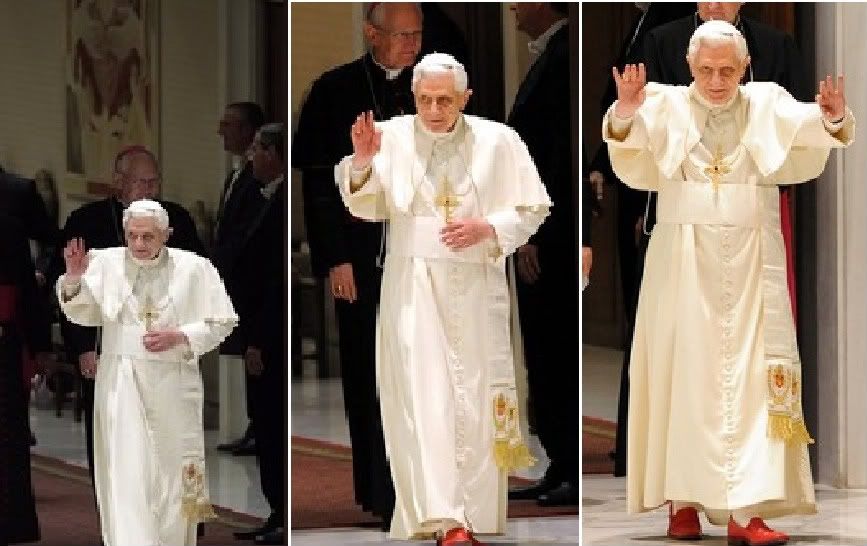
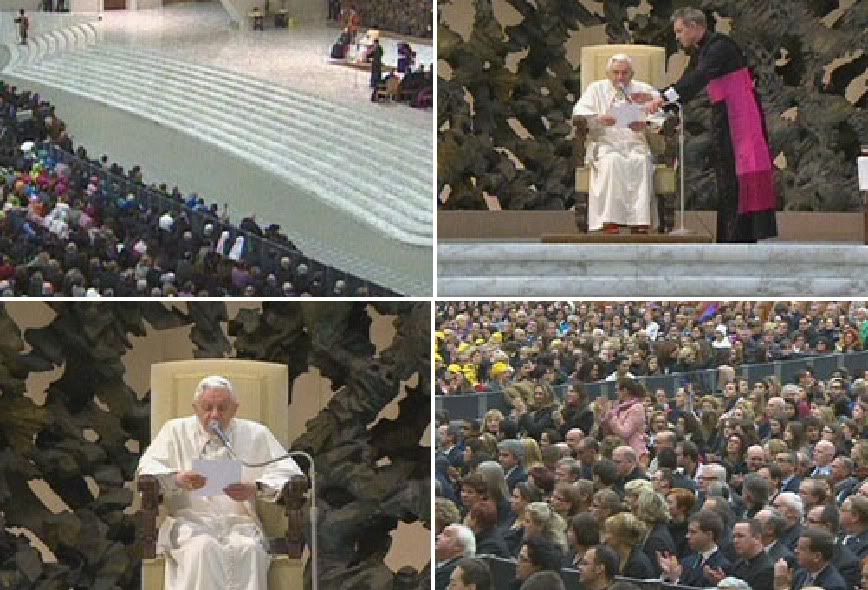 Pope outlines four pillars
Pope outlines four pillars
of Christian Unity

19 JAN 2011 (RV) - “No one should go hungry, nobody should be poor in the Christian community”, said Pope Benedict XVI Wednesday, underlining that one of the four pillars of unity is fellowship and sharing as seen in the early Christian communities of Jerusalem.
In a general audience dedicated entirely to the Week of Prayer for Christian Unity, the Pope expressed “vivid regret” for the obstacles that still remain on the journey towards full communion in Christ, once again underlining that prayer is the cornerstone of all ecumenical efforts, “the Lord must assist us on this journey, he must still help us a lot, because alone we can do nothing”.
Speaking to a crowded Paul VI audience hall, the Pope traced what he described as the “four pillars” of Christian unity, starting from the witness of early communities of Jerusalem as set out in the Acts of the Apostles, from which this year's theme was taken; “They devoted themselves to the Apostles’ teaching and fellowship, to the breaking of bread and the prayers”....
(The full text of the catechesis is translated below).
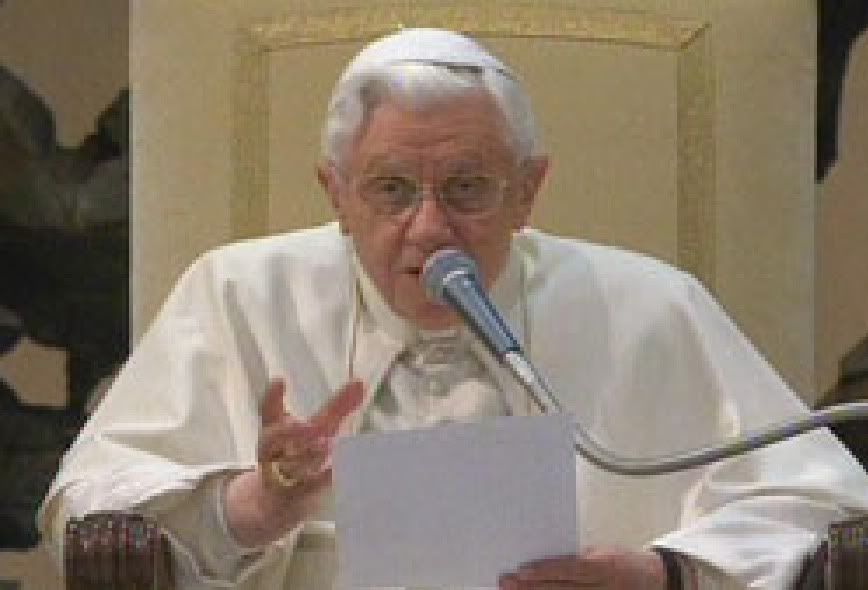
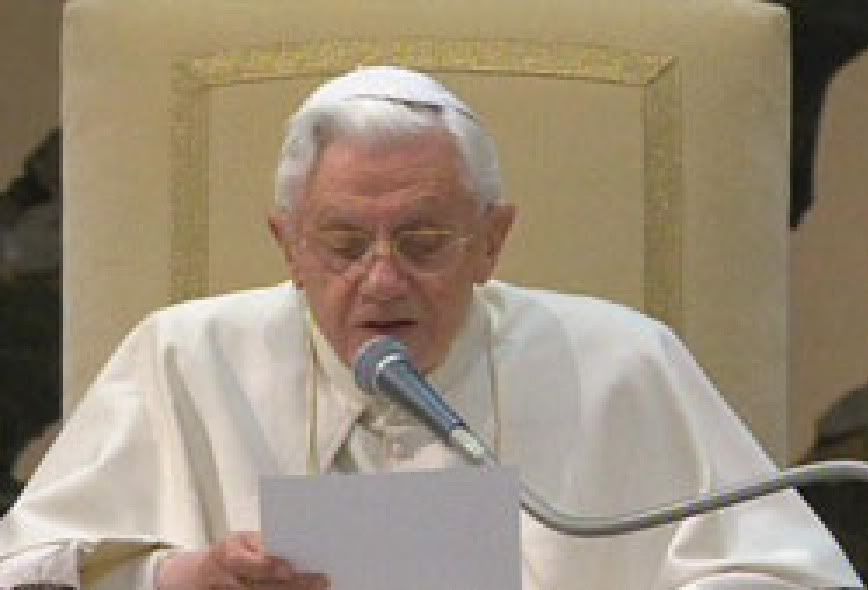
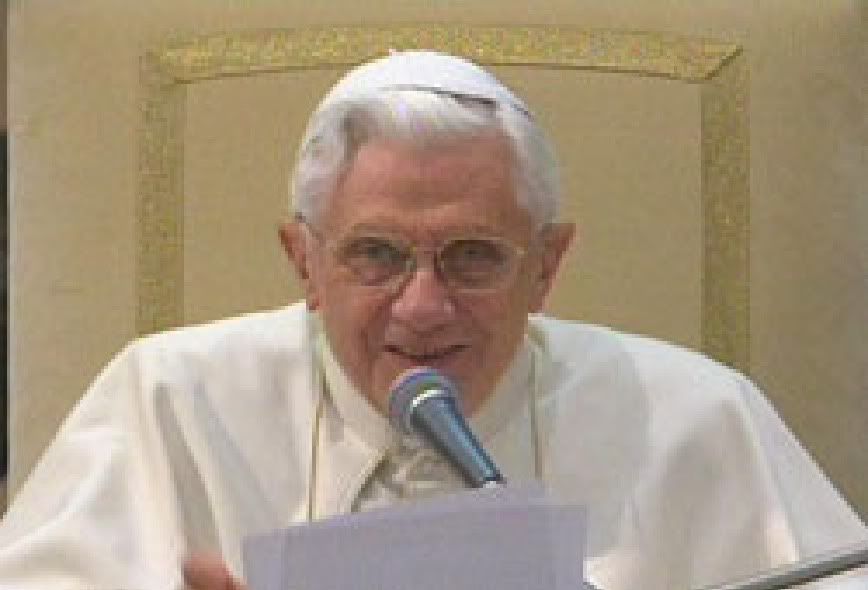 Here is a translation of the Holy Father's catechesis:
Here is a translation of the Holy Father's catechesis:
 Dear brothers and sisters,
Dear brothers and sisters,
We are celebrating the Week of Prayer for Christian Unity, in which all who believe in Christ are asked to join in prayer to bear witness to the profound bond that exists among them and to invoke the gift of full communion.
It is providential that, in the journey to build unity, prayer should be placed at the center: This reminds us, yet again, that unity cannot simply be the product of human effort - it is above all a gift of God which entails growing in our communion with the Father, the Son and the Holy Spirit.
The Second Vatican Council said: "These prayers in common are doubtless a very effective means to invoke the grace of unity and constitute an authentic manifestation of the links through which Catholics continue to be united with their separated brothers: 'For where two or three are gathered together in my name (says the Lord), there am I in the midst of them'" (Mt 18,20)(Decr. Unitatis Redintegratio, 8).
The way towards the visible unity of all Christians resides in prayer, because fundamentally, we do not 'build' this unity - it is God who 'builds' it, it comes from him, from the Trinitarian mystery, from the unity of the Father with the Son in the dialog of love that is the Holy Spirit; and our ecumenical task should open itself to divine action, it should become a daily invocation of God's help. The Church is his, not ours.
The theme chosen this year for the Week of Prayer refers to the experience of the first Christian community in Jerusalem, as described in the Acts of the Apostles. We heard the text - "They devoted themselves to the teaching of the apostles and to the communal life, to the breaking of the bread and to the prayers" (Acts 2,42).
We must consider that at the Pentecost, the Holy Spirit had descended on persons of diverse languages and cultures. This means that, from the very beginning, the Church embraced people of diverse origins, but despite these differences, the Spirit created one body only.
Pentecost as the beginning of the Church marks the extension of the Covenant of God to all creatures, to all peoples and to all times, so that all of creation may journey towards its true objective - to be the place of unity and love.
In the passage cited from the Acts of the Apostles, four characteristics defined the first Christian community of Jerusalem as a place of unity and love - and St. Luke did not mean to describe only a thing of the past.
He offers it to us as a model, as a norm for the Church today, because these four characteristics should always constitute the life of the Church.
The first characteristic: to be united and firm in listening to the teachings of the Apostles, then in fraternal communion, in the breaking of bread, and in prayer.
As I said, these four elements are still the pillars of living for every Christian commmunity, and also constitute the only solid foundation for progress in the quest for the visible unity of the Church.
First of all is listening to the teaching of the Apostles, namely, listening to the witness that they render of their mission, and of the life, death and resurrection of our Lord. It is what St. Paul simply calls 'the Gospel'.
The first Christians received the Gospel from the mouths of the Apostles - they were united in listening to it and in proclaiming it, because, as St. Paul affirms, "It (the Gospel) is the power of God for the salvation of everyone who believes" (Rom 1,16).
Even today, the community of believers recognizes in that reference to the teaching of the Apostles the standard of their own faith: every effort to construct unity among all Christians thus must pass through a deepening of our fidelity to the depositum fidei transmitted to us by the Apostles.
Firmness in faith is the foundation of our communion - it is the foundation of Christian unity.
The second element is fraternal communion. At the time of the first Christian community, as it is in our day, this is the most tangible expression, especially for the outside world, of unity among the disciples of the Lord.
We read in the Acts of the Apostles that the first Christians had 'all things in common', and that those who had property and possessions sold them to share with the needy (cfr Acts 2,44-45). In the history fof the Church, this sharing of possessions has found ever new modalities of expression.
One of these, which is quite particular, is that of fraternal and friendly relations among Christians of diverse confessions. The history of the ecumenical movement has been marked by difficulties and uncertainties, but it is also a story of brotherhood, cooperation, human and spiritual sharing, which has significantly changed relationships among believers in our Lord Jesus: We are all committed to continue along this road.
The second element, communion, is first of all, communion with God through faith. But communion with God creates communion among ourselves and is epxressed necessarily in that concrete communion described in the Acts of the Apostles, namely, sharing.
No one in the Christian community should be hungry, no one should be poor: this is a fundamental obligation. Communion with God, realized as fraternal communion, is concretely expressed in social commitment, in Christian charity, in justice.
The third element: in the life of the first Christian community of Jerusalem, the breaking of bread was an essential moment, during which the Lord himself becomes present in his unique sacrifice on the Cros, giving himself completely for the life of his friends: "This is my body, offered in sacrifice for you... This is the chalice of my blood...that was shed for you".
"The Church lives on the Eucharist. This truth does not simply epxress a daily experience of the faith, but encloses in synthesis the nucleus of the Church's mystery" (John Paul II, Enc. Ecclesia de Eucharistia, 1).
Communion in the sacrifice of Christ is the peak of our union with God and therefore represents the fullness of unity among the disciples of Christ, their full communion with each other.
During this Week of Prayer for Christian Unity, regret is particularly acute for the impossiblity of sharing the same Eucharistic table, a sign that we are still far from realizing that unity for which Christ prayed.
This sad experience, which also confers a penitential dimension to our prayer, must motivate an even more generous commitment on the part of everyone so that, once the obstacles to full communion have been removed, that day will come in which it will be possible for all of us to gather together at the Lord's table, to break the Eucharistic bread togehter, and to drink from the same chalice.
Finally, prayer - or as St. Luke says, prayers - constitute the fourth characteristic of the primitive Church of Jerusalem described in the Acts of the Apostles.
Prayer was always the constant attitude of the disciples of Christ - it accompanied their daily life in obedience to the will of God, as the words of the apostle Paul attest, who wrote in his first Letter to the Thessalonians: "Rejoice always, pray without ceasing. In all circumstances give thanks, for this is the will of God for you in Christ Jesus". (1 Ts 5,16-18l cfr Eph 6,18)
Christian prayer, participation in the prayer of Jesus, is by its nature a filial experience, as we are told in the words of the Our Father, the prayer of the family - the 'we' of the people of God, of brothers and sisters - speaking to our common Father.
To place oneself in the attitude of prayer also means opening ourselves to brotherhood. Only as the collective 'we' can we say 'Our Father'. Therefore, let us open ourselves to brotherhood which comes from being children of the one heavenly Father, and to dispose ourselves for forgiveness and reconciliation.
Dear brothers and sisters, as disciples of the Lord, we have a common responsibility to the world - we must render a common service. Like the first Christian community of Jerusalem, starting from that which we already share, we must offer strong witness, spiritually based and sustained by reason, of the one God who revealed himself and speaks to us in Christ, as the bearers of a message that orients and illuminates the way for man in our time, who is often without clear and valid reference points.
It is therefore important to grow daily in reciprocal love, striving to overcome those barriers that still exist among Christians; to feel that there is a true interior unity among all who follow the Lord; to work together as much as we can to resolve the questions that remain open; and above all, to be aware that in this itinerary, the Lord must assist us, he must help us a lot, because without him, by ourselves, without 'remaining in him', we cannot do anything (cfr Jn 15,5).
Dear friends, once more it is in prayer that we find ourselves united, particularly this week, together with all those who confess their faith in Jesus Christ, Son of God.
Let us persevere in prayer - we are men of prayer - imploring God for the gift of unity, so that his plan of salvation and reconciliation may be fulfilled for the whole world. Thank you.
[Modificato da TERESA BENEDETTA 20/01/2011 13:26] |